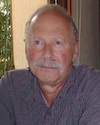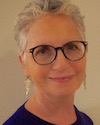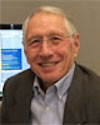Caregiver Study
- What We Do
- Who We Are
- Publications
- Caregiving Resources

Dr. Patterson has been a co-investigator for the Caregivers project since it began in 1988. He currently is an active member the Speaker's Bureau of our local Alzheimer's Association Organization, and is also a member of the Medical Advisory Board of the Glenner Alzheimer's Family Center. He is a past Board member of both our local Alzheimer's Association and of the National Alzheimer's Association.
Dr. Patterson received his undergraduate training at San Diego State University, a Master's Degree from the University of Georgia, and received his Ph.D. in Psychology from the University of California, Riverside in 1977. Since that time he has conducted research in a number of areas with research on stress responses of caregivers of Alzheimer's disease patients being central. He has authored nearly 500 scholarly papers, chapters, and book chapters on a variety of topics. Much of his published work on Caregivers has focused on understanding who experiences stress under what circumstances. He is currently the associate editor of the journal Plos-One, and has served as editor, co-editor, and on the editorial boards of a number of other journals. He has two daughters, one of whom has just released a music album with her band Feather Bright; the other is an artist and a field biologist. His wife is Canadian and is the Associate Dean of Global Health Sciences and the Chief of the Division of Global Public Health here at UCSD. Together they maintain a second home in Vancouver British Colombia. Dr. Patterson's other passions include body surfing, hiking and reading. He wanted to take this opportunity to thank all the study participants who have given their time and shared their insights about caregiving and looks forward to continuing to collaborate with you on this important project.

Dr. Ziegler has been involved in research and medical care at UC San Diego since 1980. He is interested in how the brain regulates the heart and blood vessels, primarily through the sympathetic nervous system. He carries out both basic laboratory research and human studies and has published 450 research papers. At UC San Diego he directed the General Clinical Research Center and directs hypertension services. He has served as chair of numerous NIH committees and currently chairs a NASA committee to review astronaut research programs. Dr. Ziegler is particularly interested in how stress causes high blood pressure and cardiovascular disease. In the Alzheimer’s Caregiver Project he directs measurements of the heart and blood vessels. These measurements will find if it is possible for the sympathetic nervous system to provide healthy control of the cardiovascular system.

Dr. Allison was born and raised in Campbell, California. He attended the California Polytechnic State University in San Luis Obispo and then went to medical school at the Uniformed Services University in Bethesda, Maryland. Dr Allison spent 12 years as naval medical officer and completed several tours of duty to include time in Groton, CT, Pearl Harbor, HI and San Diego, CA.
After separating from the military, Dr. Allison has worked at UC San Diego where he focuses on the prevention of chronic diseases, especially cardiovascular disease. In this work, he is studying non-invasive methods for early detection of the disease processes that lead to heart attack, stroke and peripheral arterial disease. In this regard, he has published several papers on the relationship between calcium deposits in arteries and cardiovascular risk factors. One of his studies is determining whether these calcium deposits are related to the future risk for heart attacks and strokes. Since caregivers of individuals affected by Alzheimer's disease are exposed to increased levels of stress and stress may be related to the risk for heart disease, Dr. Allison has joined the Alzheimer Caregivers research group in order to explore the potential links between stress and early forms of cardiovascular disease. Specifically, the group plans to measure the thickness of the arteries in certain parts of the body and see if thicker arteries are associated with higher levels of stress related to Alzheimer care giving. Notably, thicker arteries have been shown to be associated with an increased risk for future heart attack and stroke.

Dr. von Känel was born on August 23, 1965 in Bern, Switzerland, where he graduated from the University of Bern in 1992. After his residency in internal medicine, neurology, and psychiatry, he became a board-certified internist and psychiatrist (and psychotherapist) in Switzerland. He received his training in behavioral sciences and psychobiology as a postdoctoral researcher at the Department of Psychiatry, University of California San Diego and as co-leader of the Behavioral Research Laboratory at the Swiss Federal Institute of Technology, Zurich. In 2003, he was appointed Professor of Medicine and became the head of the Psychosomatic in- and out-patient clinic within the Department of General Internal Medicine at the University Hospital Bern. He is also the head of the Psychocardiology Unit of the Swiss Cardiovascular Center, University Hospital Bern and senior lecturer in Somato-Psychosocial and Psychosomatic Medicine at the University of Bern, Switzerland.
Dr. von Känel's main research interests focus on the psychobiological pathways linking stress and other psychosocial factors with atherosclerosis and cardiovascular diseases, particularly systemic hypertension and coronary artery disease. Much of his previous studies investigated how psychological stress and autonomic nervous system function relate to hemostatic and inflammatory activity in healthy groups, patients with cardiovascular diseases and chronically stressed caregivers of a spouse with Alzheimer's disease.

Christine graduated from Neumann College in Aston, PA where she received her Bachelor of Science in Nursing degree. She first started her career at Scripps Mercy Hospital working on the surgical-trauma unit. After a few years, she decided to follow her interest in nursing research. She made her career move to the General Clinical Research Center at UC San Diego Medical Center where she helped conduct over 200 ongoing studies from 2000-2005 as a clinical nurse. Some of these studies included pediatric metabolic disorders, improved diabetes management, blood pressure control, physiology of sex hormones and advanced cancer chemotherapy. To further her research experience, Christine then ventured out as a research nurse and clinical trials coordinator for eStudySite, a privately owned Clinical Trials Center. A few of the therapeutic studies included complicated skin and skin structure infections, hospital acquired pneumonia and DVT.
Christine was also co-coordinator of a cSSSI study with the highest enrolling site in the world. Due to her dedication in nursing research, Christine was nominated and awarded Research Nurse of the Year by PNASD in 2007. Currently, Christine resides here in San Diego with her husband and son where she was born and raised. Today, she is happy to be back with UCSD, enjoys working on the Alzheimer Caregiver Project as a clinical research nurse, and finds the subjects and the study very fascinating.

Dr. Dimsdale was born in Sioux City, Iowa and obtained his BA degree in biology from Carleton College. He then attended Stanford University, where he obtained a MA degree in Sociology and an MD degree. He obtained his psychiatric training at Massachusetts General Hospital and then completed a fellowship in psychobiology at the New England Regional Primate Center. He was on the faculty of Harvard Medical School from 1976 until 1985, when he moved to University of California, San Diego (UCSD).
Dr. Dimsdale is Professor of Psychiatry Emeritus. His clinical subspecialty is consultation psychiatry. He is an active investigator, a former career awardee of the American Heart Association, and is past-president of the Academy of Behavioral Medicine Research, the American Psychosomatic Society, and the Society of Behavioral Medicine. He is on numerous editorial boards, is editor-in-chief emeritus of Psychosomatic Medicine, and is a previous guest editor of Circulation. He has been a consultant to the President's Commission on Mental Health, the Institute of Medicine, is a long-time reviewer for NIH and the former Chair of the UC San Diego Academic Senate.
Dr. Dimsdale's major research interests include sympathetic nervous system physiology as it relates to stress, blood pressure, and sleep; cultural factors in illness; and quality of life. He is the author of more than 500 publications as well as the editor of 4 books.

Dr. Mills, a Professor of in the Department of Psychiatry and Department of Family Medicine and Public Health, has been working with Dr. Grant & Dr. Patterson on the Alzheimer's Caregiver Project since 1996. His work in the project is examining the effects of caregiving on the immune and adrenergic systems. Paul's other research interests include neuroimmune characteristics of depression and interventions for cardiovascular diseases such as heart failure, as well as integrative medicine theories. He has published approximately 350 manuscripts and book chapters on these topics. He is a long-standing NIH supported clinical investigator , Director of the UC San Diego Center for Excellence for Research and Training in Integrative Health, Director of UC San Diego Clinical Research Biomarker Laboratory, and Co-Director of UCSD's Altman Clinical and Translational Research Institute's Translational Technologies Program.

Sonia Ancoli-Israel, Ph.D. is a Professor Emeritus and Professor of Research in the Departments of Psychiatry and Medicine at the University of California San Diego (UCSD) School of Medicine and Director of the Gillin Sleep and Chronomedicine Research Center. Dr. Ancoli-Israel received her Bachelor's Degree from the State University of New York, Stony Brook, a Master's Degree in Psychology from California State University, Long Beach and a Ph.D. in Psychology from the University of California, San Francisco. Dr. Ancoli-Israel's expertise is in the field of sleep disorders and sleep research in aging. Her current interests include the longitudinal effect of sleep disorders on aging, the effect of circadian rhythms on sleep, therapeutic interventions for sleep problems in dementia, and fatigue, particularly the relationship between sleep, fatigue and circadian rhythms in cancer and other chronic illnesses. Dr. Ancoli-Israel is Past-President of the Sleep Research Society (SRS), Past-President of the Society for Light Treatment and Biological Rhythms, and was on the founding Executive Board of the National Sleep Foundation. She was honored in 2007 with the National Sleep Foundation Life Time Achievement Award and the SRS Mary A. Carskadon Outstanding Educator Award, in 2012 with Society of Behavioral Sleep Medicine Distinguished Career Award and in 2014 with the SRS Distinguished Scientist Award. Dr.

Dr. Grant is Professor and Chair of the Department of Psychiatry at the University of California, San Diego School of Medicine and is the Co-Principal Investigator for the Alzheimer Caregiver Project. He is also the Director of the HIV Neurobehavioral Research Program (HNRP). Dr. Grant graduated from the University of British Columbia Medical School in Vancouver Canada in 1966. He completed an internship at the Hospital of the University of Pennsylvania and then joined the Department of Psychiatry at that same university. He was recruited to the faculty of Psychiatry at UC San Diego in 1972. He is one of the group of faculty that was involved in the medical school when it was in its formative phase. Dr. Grant is interested in the association of life happenings to health status, and the role of factors such as coping skills, cognitive styles, social support, and aging as potential mediators in that association. In this study, he is exploring the medical, psychological, neuroendrocrinological, and neuroimmunological effects of caregiving for a spouse with Alzheimer's disease.

Dr. Mausbach is an Associate Professor at UC San Diego and a co-Principle Investigator for the Alzheimer Caregiver Project. He is a graduate of the Pacific Graduate School of Psychology (Palo Alto University) in Palo Alto, CA, where he received his degree in Clinical Psychology.
Prior to working at UCSD, Dr. Mausbach spent time at the VA Black Hills Health Care System, where he was involved in developing a rehabilitation program for individuals experiencing cognitive and memory problems. In addition, he conducted neuropsychological tests to determine a diagnosis of Alzheimer's disease or other disorders. He has also worked as a postdoctoral fellow in the Department of Psychiatry and Behavioral Sciences at Stanford University where he was involved in several research studies funded by the National Institute on Aging. One study, with over 250 caregivers, examined the effectiveness of interventions for distressed family caregivers of dementia victims. The research team was able to determine that a cognitive-behavioral intervention, which taught a wide range of coping skills to caregivers, was most effective for reducing caregiver distress. As a result of this research, Dr. Mausbach believes caregivers can learn and use specific skills to reduce stress and improve their moods and overall well-being.
Dr. Mausbach's current research continues to focus on stress and well-being in dementia caregivers. He has helped author research papers on well-being and coping, treatment options for caregivers, and the relationship between psychological stress and physical health. The newly developed Pleasant Events Program (PEP), funded by the National Institute on Aging, should help caregivers determine: a) when they experience changes in their moods (e.g., they become more sad or frustrated), b) the effect that caregiving has on their engagement in enjoyable activities, and c) if certain skills can be used to help them prevent mood changes, increase their coping skills, and improve their overall well-being.
Carly is a Staff Research Associate for the project and works as the Study Therapist delivering our interventions with caregivers. She is an undergraduate alumni of UC San Diego and has spent over 10 years working within mental health and social service settings. Carly recieved her Masters in Social Welfare (MSW) from UCLA in 2013 with an emphasis on research and evaluation. Since then, she has worked within psychiatric crisis stabalization, conducted workforce devlopment research at SDSU and is currently obtaining her hours for licensure as an LCSW.
Josefina Olvera is the Project Coordinator of the Alzheimer's Caregiver Study at UCSD. She recieved a Bachelor's degree in Psychology from CSU, San Marcos and is currently pursuing a Master's degree in Clinical Psychology from CSU, Dominguez Hills. Josefina has been involved as a research assistant in a Cognitive Psychology lab during undergraduate studies and in a Community Health Psychology lab during graduate studies.
